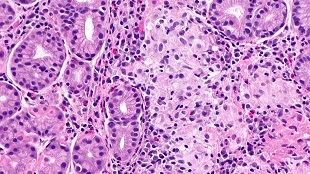 A micrograph of Crohn's disease in stomach tissueWIKIMEDIA COMMONS, NEPHRONDevelopment of Crohn’s disease may be marked by changes in the balance of bacteria in the gut, according to a study published March 12 in Cell Host & Microbe. The research team, led by Ramnik Xavier of Massachusetts General Hospital and Harvard Medical School, examined fecal samples and took intestinal and rectal biopsies from almost 670 children and adolescents with and without the disease.
A micrograph of Crohn's disease in stomach tissueWIKIMEDIA COMMONS, NEPHRONDevelopment of Crohn’s disease may be marked by changes in the balance of bacteria in the gut, according to a study published March 12 in Cell Host & Microbe. The research team, led by Ramnik Xavier of Massachusetts General Hospital and Harvard Medical School, examined fecal samples and took intestinal and rectal biopsies from almost 670 children and adolescents with and without the disease.
Pediatric patients recently diagnosed with Crohn’s had more potentially pathogenic bacteria and fewer “good” bacteria compared to those without the disease. “There is an increase in the so-called inflammation-associated bacteria and there is a decrease in bacteria that are good for health,” Xavier told ABC Science. The researchers noted that this study could not, however, distinguish whether the microbial imbalance was a cause of—or an effect brought on by—Crohn’s disease.
They also found that antibiotic use amplified the imbalance. “This study confirms that these drugs don’t do any good to people with Crohn’s disease,” gastroenterologist Séverine Vermeire of the Catholic University of Leuven, Belgium, who was not involved in the study, told ScienceNow. “We knew antibiotic use increases the risk to develop the disease; now we know they can worsen it, too.”
Gut Microbes Linked to Crohn's Disease
The gut microbiomes of patients with Crohn’s disease are markedly different than those of healthy individuals, a study finds.


The Scientist ARCHIVES
Become a Member of
Meet the Author
 This person does not yet have a bio.View Full Profile
This person does not yet have a bio.View Full Profile



















